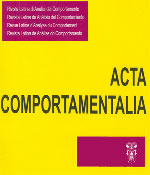Effects of punishment and extinction on the resurgence of equivalence
DOI:
https://doi.org/10.32870/ac.v17i2.18149Keywords:
Resurgence, extinction, punishment, stimulus equivalence, reorganization of equivalenceAbstract
Resurgence is a term used to describe the recurrence of previously reinforced operant after a period of nonoccurrence, when another operant that was afterward reinforced is placed on extinction or punished. Most of the studies that investigated this phenomenon used a free-operant procedure, but recently resurgence of derived relations on equivalence class research was also demonstrated. In one study, resurgence was observed after punishing the responses that were late trained. In two other studies, resurgence was not obtained after maintenance of an extinction procedure during several blocks. The present study aimed to investigate the resurgence of equivalence relations early trained, after the extinction and the punishment of the late-training-consistent responses. Twelve undergraduate students were randomly distributed into two groups. In an early training, both were submitted to a matching-to-sample procedure to establish arbitrary relations of visual stimuli, until they achieved 90% accuracy on equivalence tests. The training resulted in four classes with four stimuli each. The sixteen stimuli were then reorganized in four new classes, and a late-training matching to sample procedure was carried out to establish four new equivalence classes. After the new equivalence classes were tested and the participants achieved 90% accuracy, tests of both derived and trained relations were repeated until criterions of extinction were achieved. On these tests, responses had no consequences for Group 1. For Group 2, late-training-consistent responses were punished with a negative feedback («wrong»), while others responses had no consequences like for Group 1. Participants of Group 1 showed no resurgence of early-training-consistent responses. They maintained a high percentage of late-training-consistent responses during the 30 blocks carried out on extinction. All the participants of Group 2 showed resurgence of early equivalence relations. They presented more tan 50% of early-training-consistent responses after two blocks (two participants), tree blocks (two participants), four blocks (one participant) or nine blocks (one participant). The results of the resurgence tests from Group 2 showed that after punishing late-training-consistent responses and the early-trainedresponses resurged, the classes were entirely changed. Baseline, symmetry, and equivalence relations were all altered accordantly to the classes early trained. The present study replicates early findings demonstrating that if baseline relations are reorganized, equivalence classes are disrupted and new classes emerge. Beside that, it was demonstrated that when the late trained responses were punished the early trained responses resurged, but not when these responses had no consequences. Most of the participants of Group 1 did not change their response pattern along the 30 blocks of trials with no consequences, but they showed side effects typically observed under extinction procedures. It was concluded that equivalence relations may be reorganized and that early trained classes reemerged when late trained responses are punished. These results also indicate the necessity of further discussions about the possibility of extinction of equivalence relations.Downloads
Download data is not yet available.
Downloads
Published
2010-06-08
How to Cite
Carvalho Castro, T., & Bender Haydu, V. (2010). Effects of punishment and extinction on the resurgence of equivalence. Acta Comportamentalia, 17(2). https://doi.org/10.32870/ac.v17i2.18149
Issue
Section
Articles
License

<a rel="license" href="http://creativecommons.org/licenses/by-nc-sa/4.0/"><img alt="Licencia de Creative Commons" style="border-width:0" src="https://i.creativecommons.org/l/by-nc-sa/4.0/88x31.png" /></a><br />Este obra está bajo una <a rel="license" href="http://creativecommons.org/licenses/by-nc-sa/4.0/">licencia de Creative Commons Reconocimiento-NoComercial-CompartirIgual 4.0 Internacional</a>.






